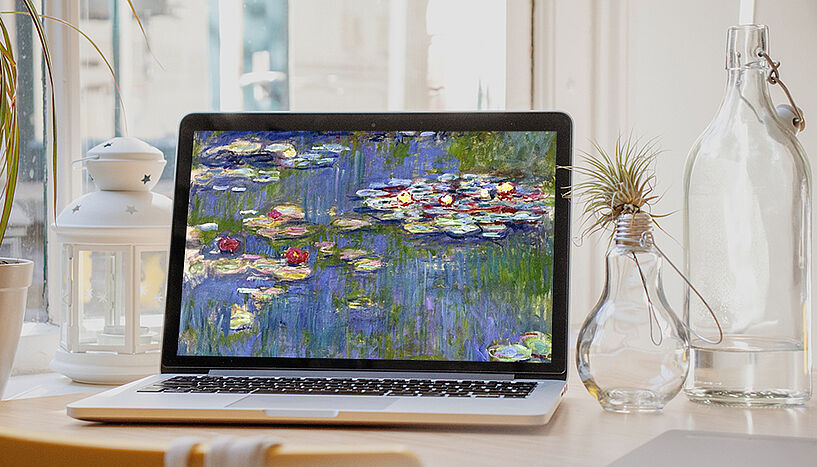Online art for real-world well-being
02. May 2023
© Lotte de Jong (via Unsplash) / Claude Monet
A new study brings us closer to understanding when and how viewing online paintings can impact our well-being.
A recent study conducted by researchers from the University of Vienna, the Max Planck Institute for Psycholinguistics, and the Max Planck Institute for Empirical Aesthetics sheds light on the potential of online art viewing as a tool for improving well-being.
The study was led by University of Vienna researchers MacKenzie Trupp and Mathew Pelowski and involved 240 participants who viewed an interactive Monet Water Lilies art exhibition from Google Arts and Culture. Results showed significant improvements in mood and anxiety after just a few minutes of viewing, highlighting the positive impact online art viewing can have on mental health.
Interestingly, the study also found that some people are more receptive to art than others and were able to benefit more. This advantage could be predicted using a metric called "aesthetic responsiveness", a personal trait developed by one of the team members. The researchers found that these additional well-being benefits reported by aesthetically responsive people were largely driven by meaning-making and pleasure felt during the art viewing.
Overall, this study offers evidence for the potential of online art interventions to have a detectable positive effect on well-being. The results published in Computers in Human Behavior highlight the potential for utilising the embeddedness of digital art media in users' lives, allowing for bite-size art experiences on demand, ready to shift them from the every day into therapeutic states of pleasure and meaning-making.
First Author Trupp suggests that "this study leads to an excitingly more nuanced understanding of the literature in the field but also emphasizes the need for further empirical investigation of possible mechanisms". Understanding that well-being can be supported without an in-person visit to a physical museum is particularly important as it is not always possible to make such a trip, especially for those in hospitals, care homes, rural towns, or in lockdown.
Original publication
MacKenzie D. Trupp, Giacomo Bignardi, Eva Specker, Edward A. Vessel, Matthew Pelowski: Who benefits from online art viewing, and how: The role of pleasure, meaningfulness, and trait aesthetic responsiveness in computer-based art interventions for well-being. Computers in Human Behavior (2023).
DOI: 10.1016/j.chb.2023.107764
Scientific contact
BA MSc MacKenzie Trupp
Department of Cognition, Emotion, and Methods in Psychology1010 - Wien, Renngasse 6-8
+43-1-4277-47111
mac.trupp@univie.ac.at
Dr. Matthew Pelowski
Department of Cognition, Emotion, and Methods in PsychologyUniversity of Vienna
1010 - Wien, Wächtergasse
+43-1-4277-47112
matthew.pelowski@univie.ac.at
Further inquiry
Mag. Alexandra Frey
Media Relations ManagerUniversität Wien
1010 - Wien, Universitätsring 1
+43-1-4277-17533
+43-664-8175675
alexandra.frey@univie.ac.at
